Rear admiral is a senior naval flag officer rank, equivalent to a major general and air vice marshal and above that of a commodore and captain, but below that of a vice admiral. It is regarded as a two star "admiral" rank. It is often regarded as a two-star rank with a NATO code of OF-7.

The National Oceanic and Atmospheric Administration Commissioned Officer Corps, known informally as the NOAA Corps, is one of eight federal uniformed services of the United States, and operates under the National Oceanic and Atmospheric Administration (NOAA), a scientific agency overseen by the Department of Commerce. The NOAA Corps is made up of scientifically and technically trained officers. It is one of only two U.S. uniformed services – the other being the United States Public Health Service Commissioned Corps – that consists only of commissioned officers, with no enlisted or warrant officer ranks. The NOAA Corps primary mission is to monitor oceanic conditions, support major waterways, and monitor atmospheric conditions.
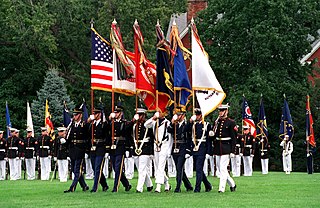
The several branches of the United States Armed Forces are represented by flags. Within the U.S. military, various flags fly on various occasions, and on various ships, bases, camps, and military academies.
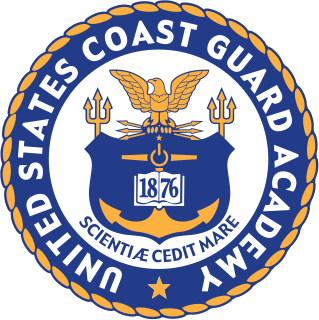
The United States Coast Guard Academy (USCGA) is a service academy of the United States Coast Guard in New London, Connecticut. Founded in 1876, it is the smallest of the five U.S. service academies and provides education to future Coast Guard officers in one of nine major fields of study. Unlike the other service academies, the Coast Guard Academy does not require a congressional nomination for admission.

The vice chief of naval operations (VCNO) is the second highest-ranking commissioned United States Navy officer in the Department of the Navy and functions as the principal deputy of the chief of naval operations and by statute, the vice chief is appointed as a four-star admiral.

The commandant of the Coast Guard is the service chief and highest-ranking member of the United States Coast Guard. The commandant is an admiral, appointed for a four-year term by the president of the United States upon confirmation by the United States Senate. The commandant is assisted by a vice commandant, who is also an admiral, and two area commanders and two deputy commandants, all of whom are vice admirals.
Admiral is a four-star commissioned naval flag officer rank in the United States Navy, the United States Coast Guard, and the United States Public Health Service Commissioned Corps, with the pay grade of O-10. Admiral ranks above vice admiral and below fleet admiral in the Navy; the Coast Guard and the Public Health Service do not have an established grade above admiral. Admiral is equivalent to the rank of general in the other uniformed services. The National Oceanic and Atmospheric Administration Commissioned Officer Corps has never had an officer hold the grade of admiral. However, 37 U.S.C. § 201 of the U.S. Code established the grade for the NOAA Corps, in case a position is created that merits the four-star grade.
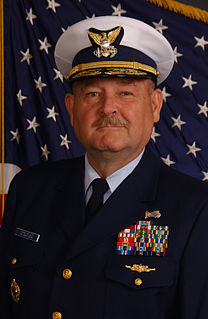
Thad William Allen is a former United States Coast Guard admiral who served as the 23rd Commandant of the Coast Guard. Allen is best known for his widely praised performance directing the federal response to hurricanes Katrina and Rita in the Gulf Coast region from September 2005 to January 2006, and for his role as National Incident Commander of the Unified Command for the Deepwater Horizon oil spill in the Gulf of Mexico in 2010. Robert J. Papp, Jr. succeeded him as Commandant on 25 May 2010, in a change of command ceremony.
A general denotes the most senior general-grade officer; it is the highest achievable commissioned officer rank that may be attained in the United States Armed Forces, with exception of the Navy. The official and formal insignia of General is defined by its four-stars.
Commodore was an early title and later a rank in the United States Navy, United States Coast Guard and the Confederate States Navy. For over two centuries, the designation has been given varying levels of authority and formality.
This article covers the organization of the United States Coast Guard.

A rear admiral in the U.S. uniformed services is either of two different ranks of commissioned officers: one-star flag officers and two-star flag officers. By contrast, in most nations, the term "rear admiral" refers to an officer of two-star rank.
Vice admiral is a three-star commissioned naval officer rank in the United States Navy, the United States Coast Guard, the United States Public Health Service Commissioned Corps, and the National Oceanic and Atmospheric Administration Commissioned Officer Corps, with the pay grade of O-9. Vice admiral ranks above rear admiral and below admiral. Vice admiral is equivalent to the rank of lieutenant general in the other uniformed services.

The Homeland Security Distinguished Service Medal is a military decoration of the Department of Homeland Security, which is presented to United States Armed Forces servicemembers for exceptionally meritorious service. The current version of the medal was established in February 2003, retroactive to March 1, 2002.
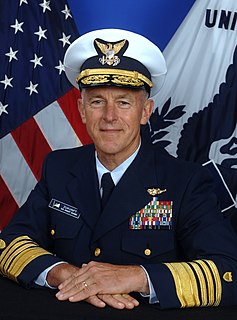
Paul Frederick Zukunft is a retired United States Coast Guard admiral who served as the 25th Commandant of the Coast Guard. He was confirmed by the U.S. Senate as the Commandant, with the rank of Admiral, in May 2014 and relieved Admiral Robert J. Papp Jr. as Commandant on 30 May 2014. Prior to his selection as Commandant, he served as Commander, Coast Guard Pacific Area. In this position, Zukunft was the operational commander for all U.S. Coast Guard missions within the half of the world that ranges from the Rocky Mountains to the waters off the East Coast of Africa. He concurrently served as Commander, Defense Force West and provided U.S. Coast Guard mission support to the U.S. Department of Defense and Combatant Commanders.

The vice commandant of the Coast Guard serves as the second-in-command of the United States Coast Guard.

Peter Vance Neffenger is a United States Coast Guard Admiral and public servant who served as Administrator of the Transportation Security Administration from July 2015 to January 20, 2017.
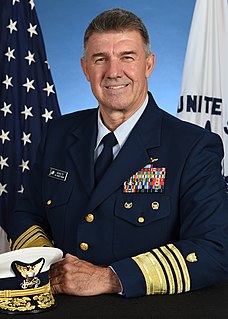
Karl Leo Schultz is an American United States Coast Guard admiral serving as the 26th Commandant of the Coast Guard.











